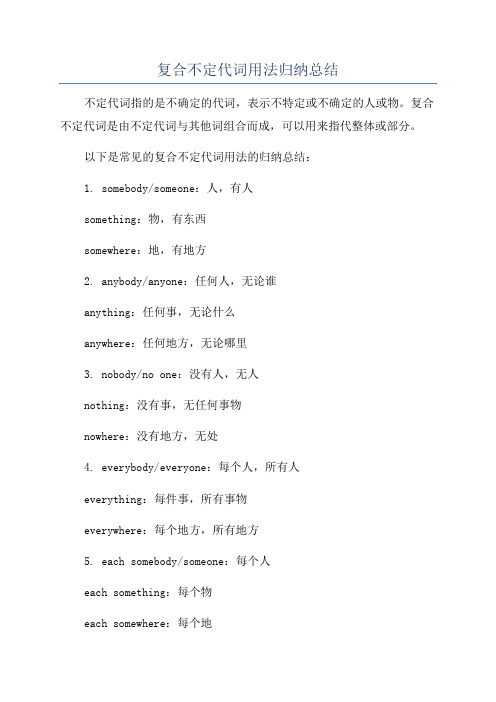不定代词somethinganything及nothing特殊用法归纳
something anything nothing的用法详解

something anything nothing的用法详解标题:Something, Anything, Nothing的用法详解引言:本文将详细探讨英语中something、anything和nothing这三个词的用法。
这些词在日常交流中经常被使用,但很多人对它们的确切用法以及它们在句子中扮演的角色并不清楚。
通过本文的阐述,你将更好地理解如何正确运用这三个词,并对它们在句子中的作用有更全面而深刻的认识。
第一部分:介绍something、anything和nothing的基本用法(400字)1. Something的用法:- Something用于表示某事或某物,但并不具体指明是什么。
它指代一个不确定的实物或状态。
- Something可以用在肯定句中,也可以用在疑问句中,用来表示对某事的期待或询问信息的需求。
- 例句:I have something for you.(我有一样东西给你。
)Did you say something?(你刚说了什么吗?)2. Anything的用法:- Anything表示任何事物或任何东西,通常用于否定句或疑问句中。
- Anything常用于否定句中,表示对所有事物或选择都没有限制。
- 例句:I don't have anything to do.(我没事可做。
)Is there anything I can help you with?(有什么我可以帮助你的吗?)3. Nothing的用法:- Nothing表示没有事物、没有东西或没有发生任何事情。
- Nothing常用于否定句中,它强调完全没有任何东西。
- 例句:I know nothing about it.(我对此一无所知。
)There is nothing to worry about.(没有什么可担心的了。
)第二部分:something、anything和nothing的进阶用法(600字)1. Something的进阶用法:- Something可用于加强陈述句的语气,表示强调或肯定的意思。
复合不定代词用法归纳总结

复合不定代词用法归纳总结不定代词指的是不确定的代词,表示不特定或不确定的人或物。
复合不定代词是由不定代词与其他词组合而成,可以用来指代整体或部分。
以下是常见的复合不定代词用法的归纳总结:1. somebody/someone:人,有人something:物,有东西somewhere:地,有地方2. anybody/anyone:任何人,无论谁anything:任何事,无论什么anywhere:任何地方,无论哪里3. nobody/no one:没有人,无人nothing:没有事,无任何事物nowhere:没有地方,无处4. everybody/everyone:每个人,所有人everything:每件事,所有事物everywhere:每个地方,所有地方5. each somebody/someone:每个人each something:每个物each somewhere:每个地6. some somebody/someone:一些人some something:一些物some somewhere:一些地7. no somebody/someone:没有人no something:没有物no somewhere:没有地8. both somebody/someone:两个人both something:两个物both somewhere:两个地9. either somebody/someone:任一个人either something:任一个物either somewhere:任一个地10. neither somebody/someone:两个都不是人neither something:两个都不是物neither somewhere:两个都不是地11. all somebody/someone:所有人all something:所有物all somewhere:所有地这些复合不定代词可以在句子中作主语、宾语、或者介词的宾语等,具体用法要根据上下文语境来确定。
复合不定代词something,anything,everything,nothing

复合不定代词something,anything,everything,nothing 复合不定代词something,anything,everything,XXX:某事物,用于肯定句I XXX.anything:任何事物,用于否定句&疑问句There XXX.everything:每件事,一切事物,最重要的Food XXX.nothing:没东西There XXX.用法:1.其作主语时谓语动词用第三人称单数形式XXX.XXX.2.其被定语(描述词)所润饰时,描述词需后置There XXX.3.表示“请求”、“建议”or希望得到对方的肯定回答时。
用于疑问句XXX?练:1、挑选1something可()1.-Do you want ______ to eat?Yes.I’m hungry now.A.XXX()2.-What are you going to give your mother for her birthday?I will buy her ___________.A.XXXC.XXX3.XXX’t want to eat ________.A.XXX()4.I agree with most of what you said,but I don’t agree with _____.XXX()5.Is there ________ wrong with the computer?A.XXX、改写句子1)Jack gave me something to eat.(改为否定句)XXX’t give me ________ to eat.2)There is nothing in the bag now.(改为同义句)There ______ _______ in the bag now.3、翻译我有些重要事情告诉你。
I have _______ ________ to tell you.。
2024年初中英语语法归纳之不定代词用法例举

2024年初中英语语法归纳之不定代词用法例举①一般用于肯定句中的不定代词:some, someone, somebody, something。
②一般用于否定句、疑问句和条件句中的不定代词:any, anyone, anybody, anything。
③一般用于句中表示否定意义的不定代词:no, no one, nobody, nothing。
④不定代词one指代可数名词,既可指人,亦可指物,它可以代替上文中出现的单数可数名词,指代复数名词时可以用ones。
⑤none通常只用作名词,在句中作主语、宾语等。
意为“没有任何(人或物)”,既可指人,亦可指物。
⑥both指两个人、物或群体;all指三个以上的人、物或群体或泛指一切事物。
⑦each一般用于指两个或两个以上的人或物,侧重个别;every 用于指三个或三个以上的人或物,侧重全体。
而且each所指对象在上下文中已十分明确。
⑧other具有名词和形容词性质,既可指人,亦可指物。
other 常与定冠词the连用。
不定冠词an与other连用则组成another。
other只作形容词或代词,表示“其他的,别的”,不可单独使用。
the other作形容词或代词,特指两者中或两部分的另一个或另一部分。
others相当于“other+名词”,泛指“别的人或物”,只有名词性用法。
the others相当于“the other+名词”,表示“剩下的,其余的”,特指除此之外的全部人或物。
another作形容词或代词,泛指三个或三个以上不定数目中的“另一个”。
⑨either指“两者中的任何一个”;neither指“两者中无一”,具有否定意义。
⑩many和much具有名词和形容词的性质,都表示“许多、大量”。
Much一般只能指代或修饰不可数名词,many只能指代或修饰复数可数名词。
Most指“大部分、大多数”。
(11) a few 和a little 意为“少数、少量”,其意义是肯定的。
英语语法:不定代词something,anything,nothing,everything

英语语法:不定代词something,anything,nothing,everything
为什么我的英语水平总是上不去?补语法吧,学好英语造句的规则,才能快速提高英语水平,系
统全面学英语,最新课程:英语语法基础速成第1期。
3. something, anything, nothing,everything
something某事物, anything什么事,任何事物,用法同some, any; nothing没有东西,没有什
么,表示否定意义。
everything指“每件事,每样事物,一切,所有事物”的意思。
比如:
something
Please say something about the pictures.
请看图说话。
Don’t you want to buy something?
你不想买点什么?
anything
Are you doing anything tonight?
今晚你有事情吗?
There’s hardly anything left in the box.
盒子里几乎没有剩下什么东西。
nothing
There’s nothing interesting in today’s newspaper.
我对这个国家的情况一无所知。
I know nothing about the country.
我对这个国家的情况。
everything
Everything is tall right with Lily.
莉莉一切顺利。
不定代词的用法

一、选择 1. Is there ____ in today's newspaper ? A. funny anything B. anything funny C. something funny 2. Please keep quiet, everyone! I have ____to tell you. A. important anything B. anything important C. somThere is ____ with my computer. Can you help me mend it? A. nothing wrong B. wrong anything C. something wrong.
作业:
从方框中选择适当的不定代词填空。 anything, someone, everyone, anyone, everything, something, nothing anyone 1.I don't know _______ at this school because I am new. Everyone 2. _______ is ready. Let's start the party. anything 3. -Look ! Can you see ________ behind the tree? -Yes, I think it's a cat.
everyone 5. - Yang Bin, is _________ here today? - No, Jim isn't here. He's ill. anything 6. -Do you have ________to say for yourself? - No, I have ________ to say. nothing
somethinganything和nothing特殊用法归纳

somethinganything和nothing特殊用法归纳something, anything和nothing特殊用法归纳在英语中,有三个词汇经常被用来表示事物或概念的不同程度,它们分别是something、anything和nothing。
这三个词汇在不同语境下有着特殊的用法和含义。
接下来,我们将对它们的用法进行详细归纳,帮助读者更好地理解和运用这些词汇。
1. somethingsomething 意为“某事物”,用于表示某种未指明的事物或概念。
以下是 something 的常见用法:1.1 表示一个具体的事物或物品:- Would you like something to drink?(你想要点喝的吗?)- She found something interesting in the bookstore.(她在书店发现了一些有趣的东西。
)1.2 表示一些未具体指明的事物或概念:- There's something wrong with the computer.(电脑出毛病了。
)- I need something to wear to the party.(我需要找件参加派对的衣服。
)1.3 在肯定句中表示某种程度的事物或概念:- He achieved something great during his time as a student.(他在学生时代取得了一些伟大的成就。
)- I want to do something meaningful with my life.(我想用我的生活做些有意义的事情。
)2. anythinganything 意为“任何事物”,用于表示无论什么事物,包括否定和疑问句。
以下是 anything 的常见用法:2.1 表示对无所谓的选择或可能性:- You can eat anything you want at the buffet.(自助餐厅里你可以吃任何你想吃的东西。
不定代词用法总结

不定代词用法总结不定代词是在句子中代替特定人或物的词语,它们的使用能够让句子更加简洁明了。
下面是对不定代词的用法做一个总结。
1. 一般不定代词一般不定代词包括"something"、"anything"、"nothing"、"everything"等,它们用来代替不具体指向的事物。
例如:- I have something to tell you.- Is there anything I can do for you?- Don't worry, it's nothing serious.- She knows everything about that topic.2. 不定代词"some"和"any""some"和"any"可以用作不定代词,也可以用作不定代词,具体使用要根据句子的语境来确定。
当"some"用作不定代词时,表示肯定或推测的意思。
例如:- There are some books on the table.- Can I have some water, please?当"any"用作不定代词时,表示否定或疑问的意思。
- I don't have any money with me.- Do you have any ideas for the project?3. 不定代词"somebody"、"anybody"、"nobody"和"everybody"这些不定代词用来代替人。
它们的使用方式类似于前面提到的一般不定代词。
例如:- Somebody is waiting for you outside.- Nobody knows the answer.- Can anybody help me with this problem?- Everybody enjoyed the party.4. 不定代词"each"和"every""each"和"every"用来代替三者或多者中的每一个。
- 1、下载文档前请自行甄别文档内容的完整性,平台不提供额外的编辑、内容补充、找答案等附加服务。
- 2、"仅部分预览"的文档,不可在线预览部分如存在完整性等问题,可反馈申请退款(可完整预览的文档不适用该条件!)。
- 3、如文档侵犯您的权益,请联系客服反馈,我们会尽快为您处理(人工客服工作时间:9:00-18:30)。
不定代词somethinganything及nothing特殊
用法归纳
不定代词something、anything及nothing特殊用法归纳
不定代词是英语语法中的重要部分,它们可以代替实际的人、物或情况,使句子更加简洁和灵活。
其中,something、anything及nothing 是常见的不定代词,在不同的语境中具有特殊的用法。
本文将对这三个不定代词的特殊用法进行归纳和总结。
一、something的特殊用法
1. 表示肯定意义的某事物或某情况
something用于肯定句,表示某事物或某情况,通常用来指代特定的事物或情况,但是具体的事物或情况并不明确。
例句:
- I need something to drink.(我需要喝点什么东西。
)
- She said something funny.(她说了一些有趣的事情。
)
2. 表示建议或提议
something还可以用于表示建议或提议,表示“有什么事物可以做”,常用于疑问句或条件句中。
例句:
- Why don't we do something different this weekend?(这个周末我们
为什么不做点不同的事情呢?)
- If you have something to say, please speak up.(如果你有什么话要说,请大声说出来。
)
3. 表示程度
在某些句型中,something可以用来加强程度,表示“非常”或“相当”。
例句:
- She is something of a genius.(她有些天才。
)
- The movie was something amazing.(这部电影相当精彩。
)
二、anything的特殊用法
1. 表示否定意义的任何事物或任何情况
anything用于否定句,表示任何事物或任何情况,强调没有限制和
选择的范围。
例句:
- I don't want anything to eat.(我什么都不想吃。
)
- She didn't say anything about the incident.(她对这件事情什么都没说。
)
2. 表示疑问或请求对方提供信息
anything用于疑问句或条件句中,用来询问或请求对方提供信息,表示“有什么事物可以提供”或“你有什么想法”。
例句:
- Is there anything else I can help you with?(还有什么我可以帮您的吗?)
- Do you want anything from the supermarket?(你想从超市买点什么吗?)
3. 与not连用,表示强调否定
anything与not连用,用于强调否定,表示“任何事物都不”。
例句:
- I have nothing to do with anything he said.(他说的任何事情与我无关。
)
- She does nothing right; everything she does is wrong.(她一事无成,她做的每件事都是错的。
)
三、nothing的特殊用法
1. 表示否定意义的没有事物、没有情况
nothing用于否定句,表示没有事物或没有情况,与something相对应。
例句:
- There's nothing in the fridge.(冰箱里没有东西。
)
- He said nothing about the plan.(他对计划一无所知。
)
2. 表示强调对比
nothing也可以用来表示强调对比,强调一个事物或情况的不存在。
例句:
- There is nothing more important than family.(没有什么比家庭更重要。
)
- It means nothing to me.(这对我来说毫无意义。
)
3. 与but连用,表示事情与预期相反
nothing与but连用,表示事情与预期相反,常用于表示出乎意料的
结果或情况。
例句:
- I expected her to be angry, but she said nothing.(我以为她会生气,
但她什么也没有说。
)
- He promised to help, but in the end, he did nothing.(他答应帮忙,但最后什么都没做。
)
通过对something、anything及nothing的特殊用法进行归纳,我们
可以更好地掌握这些不定代词的用法。
在实际运用中,我们要根据具
体的语境,选择合适的不定代词,使句子表达更加准确、流畅、地道。
